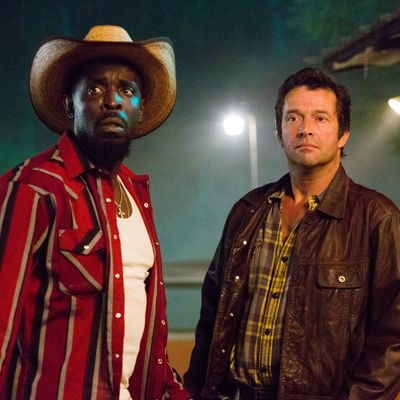
Sundance’s buddy drama Hap and Leonard is the kind of series where a beautiful woman who’s also trouble uses her wiles to lure a down-at-his-heels ex-husband into a criminal scheme. More importantly, though, it’s the kind of series that doesn’t get around to the proposition until nearly 15 minutes into the pilot. First we get scenes of the hero and his buddy getting laid off from their job on a rose-bush plantation and hanging out and busting each other’s chops in the small woodland home they share, followed by a lovely sequence where the hero and his ex sit in a window and drink coffee while the sound of country music on an AM radio mingles with the noise of rain pattering on the roof, followed by a slow dance in the kitchen.
Created by writer Nick Damici and director Jim Mickle, set in the 1980s, and based on a series of novels by the great Texas writer Joe R. Lansdale, Hap and Leonard is in no hurry to get to the point — and that’s part of what’s so pleasurable about it. It has been compared in reviews to Justified, probably because of its laid-back characterizations, courtly drawls, and working-class to working-poor milieu. But the show it reminds me of most is the primary tonal influence on Justified, The Rockford Files, which was ultimately less concerned with whatever case James Garner’s private eye happened to be solving than with the oddball personalities he met along the way and the seedy-beautiful southern California settings he traveled through.
James Purefoy plays Hap, a white ex-convict and draft dodger, and Michael Kenneth Williams is Leonard, his best friend, a black, gay Vietnam veteran. Christina Hendricks plays Trudy, Hap’s ex-wife, who convinces the duo to help her and her hippie boyfriend, Howard (Bill Sage), who’s part of a cultlike New Age group populated by criminals and fringe-types. The main plot finds Hap, Leonard, and the gang trying to retrieve a stash of sunken money from a river beneath an iron bridge; the circumstance of the money’s submersion are depicted in a lively opening chase scored to Creedence Clearwater Revival and featuring vintage 1960s police cars with single lights on top. Soon enough the series introduces other plotlines and other characters, including a murderous couple played by Jimmi Simpson and Pollyanna McIntosh, and delves into the tragic, intertwined pasts of Hap and Leonard. But the plot machinations are never the point of any scene or sequence. It’s always mainly about atmosphere, lively characterizations, and smart, attentive actors pinging off of each other from moment to moment.
I don’t want to oversell the series, as many have unfortunately done, because it does have its problems. There are times when it’s a little too relaxed for its own good, and it has trouble reconciling its wit and sexiness with bursts of harrowing violence that feel imported from a Quentin Tarantino movie (or a film by one of Tarantino’s imitators). But the sum total is so beguiling and unusual — for television as a whole, if not for Sundance, which specializes in this kind of storytelling — that it’s hard not to become entranced by it. The leads’ chemistry is perfect. Purefoy’s slightly sad and anguished good looks are Garneresque, which is never a bad thing, and the show constantly undercuts any possibility of hero worship by repeatedly drawing attention to his aimlessness (the very first conversation in the pilot is a joke at the expense of his receding hairline). Williams is, as usual, magnificently truculent, and gets most of the best lines, a few of which might as well be emblazoned on T-shirts and sold online by the Sundance Channel: “You can’t take a man’s job, but you can take his cookies.” “A stiff dick ain’t got no conscience.” “I tell you, boy, I let you talk me into some dumb shit, but this here takes the dumb-shit cake.”
Bubbling just underneath all the easygoing byplay and occasional bursts of mayhem is a dead-on accurate portrait of race relations in the former Confederate states 30 years ago, which is not necessarily something you expect or need from a crime series, but is welcome nonetheless. The N-word is bandied about pretty freely here, but always in a specific cultural context, and it’s juxtaposed against the utopian-left pieties and New Age cliché-speak of many of the show’s white characters — especially the criminals, whose obsession with making a big score and retiring to a life of leisure mirrors the progress of many counterculture-minded whites as they transformed from hippies to yuppies. (The Big Lebowski was smart about this, too.) Hap and Leonard is a smart show that doesn’t preen about how smart it is. Its complexities are sunk deep in the texture, and you have to dive for them.


